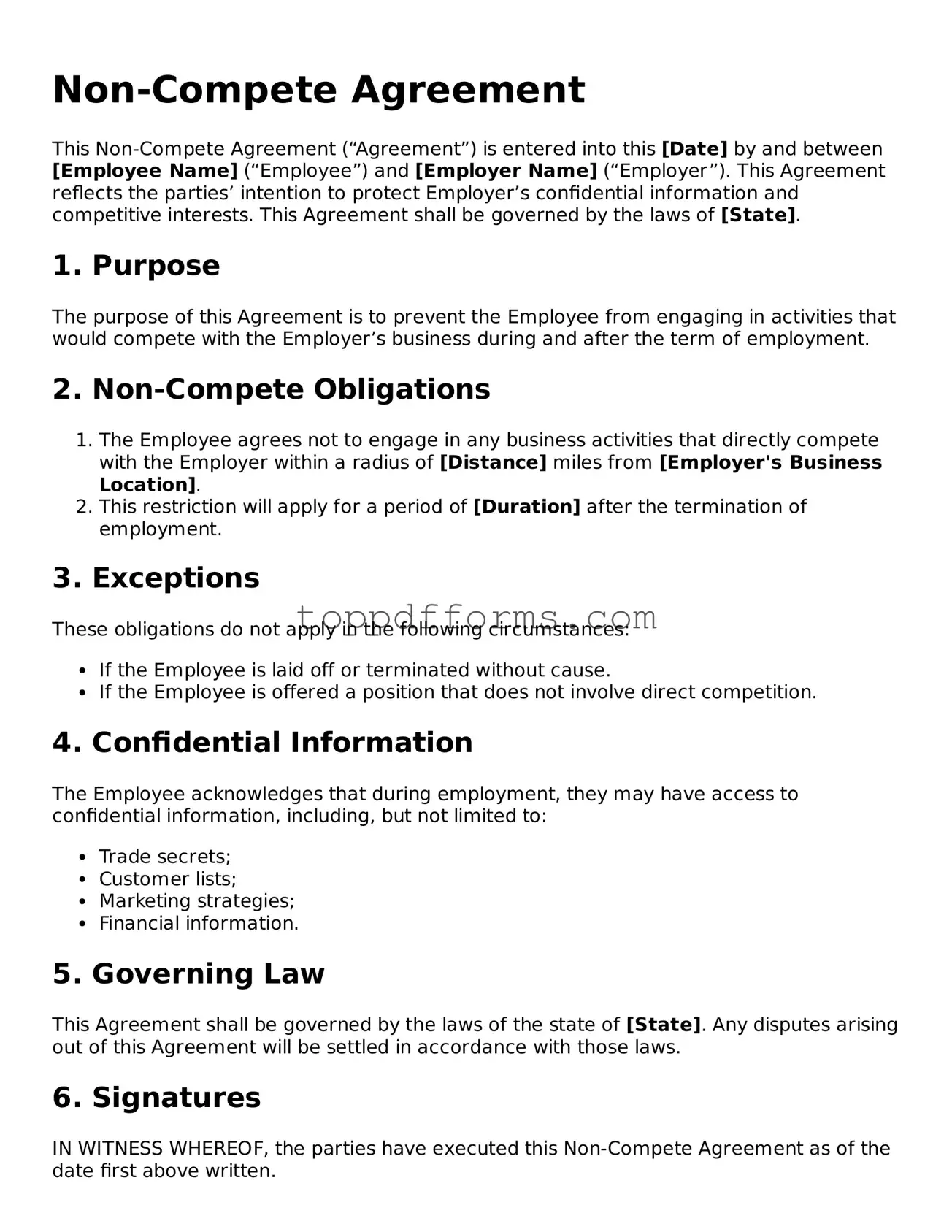Free Non-compete Agreement Template
State-specific Guidelines for Non-compete Agreement Documents
Things You Should Know About This Form
What is a Non-compete Agreement?
A Non-compete Agreement is a legal contract between an employer and an employee. It restricts the employee from engaging in activities that compete with the employer's business for a certain period after leaving the company. The goal is to protect the employer's trade secrets, proprietary information, and customer relationships. These agreements vary widely in their terms, including duration, geographical scope, and the specific activities that are restricted.
Why would an employer require a Non-compete Agreement?
Employers often require Non-compete Agreements to safeguard their business interests. By preventing former employees from working with competitors, they aim to maintain a competitive edge. This is particularly important in industries where sensitive information or specialized training is involved. Employers believe that such agreements help to protect their investments in employee training and development, as well as their customer base.
Are Non-compete Agreements enforceable?
The enforceability of Non-compete Agreements can vary by state. Some states have strict regulations that limit their scope, while others are more lenient. Courts typically evaluate whether the agreement is reasonable in terms of duration, geographic area, and the nature of the restricted activities. If an agreement is deemed overly broad or unfair, a court may refuse to enforce it. Therefore, it is essential for both parties to understand the specific laws in their state regarding Non-compete Agreements.
What should I consider before signing a Non-compete Agreement?
Before signing a Non-compete Agreement, individuals should carefully review its terms. Consider the duration of the restrictions and the geographical area covered. It's also important to assess how the agreement might impact future job opportunities. Seeking legal advice can provide clarity on the implications of the agreement and whether it is reasonable. Understanding the potential consequences can help in making an informed decision about whether to sign.
PDF Overview
| Fact Name | Description |
|---|---|
| Definition | A non-compete agreement is a contract that prevents an employee from working for competitors or starting a competing business for a specified period after leaving a company. |
| Purpose | The primary purpose is to protect an employer's business interests, trade secrets, and confidential information. |
| Duration | Typically, non-compete agreements specify a time frame, which can range from several months to a few years, depending on the state laws and the nature of the business. |
| Geographic Scope | The agreement often outlines a specific geographic area where the employee is restricted from competing, which must be reasonable and justifiable. |
| Enforceability | Enforceability varies by state; some states enforce non-compete agreements strictly, while others may impose limitations on their scope and duration. |
| State-Specific Laws | In California, for example, non-compete agreements are generally unenforceable, whereas states like Texas allow them under certain conditions. |
| Consideration | For a non-compete agreement to be valid, there must be consideration, which means the employee must receive something of value in exchange for signing the agreement. |
| Legal Review | It is advisable for both employers and employees to have a legal review of the non-compete agreement to ensure it complies with state laws and is fair to all parties involved. |
Common mistakes
Filling out a Non-compete Agreement can be a straightforward process, but many individuals make common mistakes that can have significant consequences. One frequent error is failing to read the entire document thoroughly. It’s essential to understand every clause before signing. Ignoring fine print can lead to unintended restrictions on future employment opportunities.
Another mistake is not providing accurate information. Misrepresenting employment history or current job roles can void the agreement or lead to legal challenges later. Honesty is crucial. Ensure that all details are correct and up to date.
People often overlook the duration of the non-compete clause. Some may agree to terms without realizing how long they will be restricted from working in their field. It is vital to negotiate a reasonable timeframe that aligns with industry standards.
Inadequate geographical scope is another common issue. Many individuals fail to consider the areas where the non-compete will apply. A broad geographical restriction can limit job opportunities significantly. It is advisable to clarify and negotiate this aspect to avoid being locked out of entire regions.
Additionally, some individuals do not seek legal advice before signing the agreement. Consulting with a legal professional can provide insights into the implications of the contract. A lawyer can help identify any potential pitfalls and suggest necessary modifications.
People sometimes neglect to consider the competitive landscape of their industry. Signing a non-compete without understanding the market can lead to difficulties in finding new employment. Researching industry norms can help in negotiating fair terms.
Another mistake is failing to discuss the agreement with the employer. Open communication can lead to a better understanding of the expectations and can result in a more favorable agreement. Employers may be willing to adjust terms if approached thoughtfully.
Lastly, many individuals do not keep a copy of the signed agreement. This oversight can create problems in the future if disputes arise. Always retain a copy for personal records to ensure you have access to the terms agreed upon.
Common Documents
Job Application Spanish - Provide a brief description of the work you performed.
In Oklahoma, acquiring a Durable Power of Attorney form is crucial for anyone wanting to ensure their financial and healthcare decisions are managed as they wish, especially in times of incapacity. For more information on how to set up this important legal document, you can obtain the necessary paperwork by visiting the Durable Power of Attorney form link provided.
How Much Does It Cost to Terminate Parental Rights in Texas - The parent must confirm they are relinquishing their rights irrevocably after a specified period.
